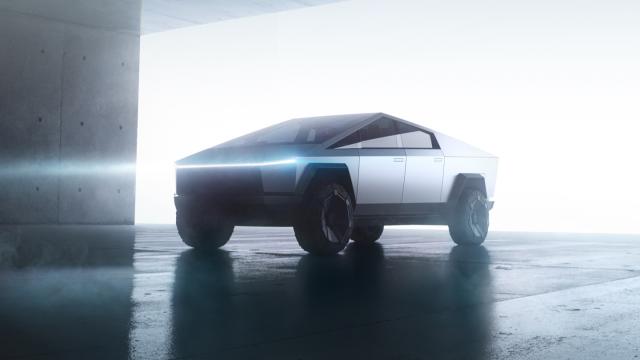There are two things we should acknowledge off the bat, even though they’re beside the point. The first is that the Tesla Cybertruck is hideous, of course. That’s blatantly obvious to anyone who sees it. The second is that people don’t “need” pretty design, but even both of those points are academic.
Where I should really start is that Tesla makes cars but it doesn’t really work like a car company. It’s no longer a startup, but it’s still run with a startup mentality. That is, the Tesla model seems less interested in selling cars to make a profit to keep selling cars so much as it is attracting investment on the idea that it is a company that produces the future of the auto industry. Hype is fundamental to the business. Tesla is built on hype. It needs investors to believe it can be more than it is, whereas, say, GM or Ford work to convince investors they still are what they are and will continue to be, more or less.
The way Tesla works is by securing investment. Speaking even of deposits alone, Bloomberg noted last year (in an article titled Tesla Doesn’t Burn Fuel, It Burns Cash) that the company was “sitting on a staggering $US985 million ($1.45 billion) in customer deposits as of the end of the first quarter,” picking up deposits even for cars and tech that didn’t yet exist, from $US3,000 ($4,420) for “Full Self Driving capability,” to $US20,000 ($29,464) for the Tesla Semi. And earlier this year Bloomberg clarified again just what the hype means for Tesla’s survival, in an article noting that customers have been having a hard time getting their refundable deposits back:
Customer deposits are categorised as liabilities on Tesla’s balance sheet, meaning it’s effectively served as an interest-free form of borrowing.
“Similar to using launches of a car two or three years before it actually hits the road, and using that as a source of crowd funding, they’ve done that with deposits,” said Jeffrey Osborne, an analyst at Cowen & Co. who has the equivalent of a sell rating on Tesla.
Tesla gets its deposits, all its investments by getting people to believe in it, and to believe in the idea of Tesla more than the reality of Tesla. That’s why its driver-assistance technology is called Autopilot and why GM’s is called SuperCruise, even though they’re both glorified versions of cruise control. The whole premise is to over-promise.
That is what Elon does. He promises battery swapping.
He promises highways lined with giant powerdicks.
He promises cross-country drives with no drivers.
He promises robot snakes to charge your car.
He promises a $US35,000 ($51,562) Tesla Model 3.
He promises a new Roadster.
He promises a Semi Truck.
And now he’s promising a “Cybertruck,” just daring us to say that it’s bullshit. Even with the name. Even with the I just learned 3D rendering this week body styling.
Debating the points of the truck are pointless. Elon says it will cost just under $US40,000 ($58,928) and have hundreds of kilometres of range and a cool tent! I love a tent. I love sleeping in them, when they are real, and not just renders by a company that has a better track record of not making what it says it will.
The Cybertruck’s ideas are fine ideas. But again, they’re academic until we actually see the thing in showrooms; showrooms, I must point out, which have been grossly mistreated by Tesla’s business style.
Is it ugly? Again, of course it is. But we don’t really need our cars to be pretty. The Cybertruck reminds me of those weird triangle-shaped electric cars of the 1970s, ones that operated in an alternate universe where people didn’t buy into the auto industry’s bullshit and just bought the most utilitarian vehicle possible.
We don’t really need our pickup trucks at all, really. All the air-hauling pickup buyers would probably be better served even with this PS2-looking-arse Tesla. I hope they buy it. Why not hope? What else do we even have to go on right now?
